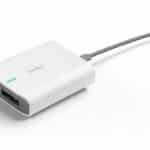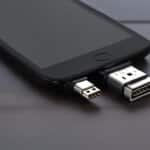Table of Contents
If you’ve ever wondered what a USB-C cable is, you’re not alone. As technology advances, so do the cables that connect our devices. USB-C is the latest standard for connectors and cables, and it’s quickly becoming the industry norm for many devices, including laptops, smartphones, and tablets. So, what is a USB-C cable, and why is it essential to modern devices?
A USB-C cable is a type of connector and cable that allows for fast data transfer and charging between devices. It has a small, compact design that can transmit data, audio, and video signals.
Unlike older USB cables, which had an asymmetrical design that only allowed them to be plugged in one way, USB-C cables are reversible, meaning they can be plugged in either way. This feature adds to their convenience and ease of use.
In summary, a USB-C cable is a new type of connector and cable that enhances connectivity in modern devices. It has a compact design, reversible plug orientation, and allows for fast data transfer and charging.
Key Takeaways
- A USB-C cable is a new type of connector and cable for modern devices.
- It has a compact design and is reversible, allowing for easy and convenient use.
- USB-C cables offer fast data transfer and charging capabilities.
- The USB-C standard is rapidly becoming the industry norm for many devices.
- USB-C cables are an essential component for modern connectivity.
USB-C Cable: A Versatile Connectivity Solution
USB-C cables have revolutionised connectivity between devices with their versatility, making them a must-have in modern times. They are compatible with various devices, including smartphones, tablets, laptops, and desktops. This is because USB-C cables come with different adaptors that allow them to connect to various ports, meaning one cable can transfer data, charge a device, or connect a peripheral to different types of ports.
Furthermore, USB-C cables are reversible, ensuring a user-friendly interface as it can be plugged in either way, saving time and energy. This provides a great deal of convenience to users, eliminating the hassle of finding the correct alignment when connecting devices.
When it comes to compatibility, USB-C cables can be used interchangeably with different devices, making them versatile in connecting all device types. Additionally, their ability to transfer data and charge devices simultaneously is an added advantage, as users can multitask without worrying about draining their battery life.
Benefits of USB-C Cable: A Versatile Connectivity Solution
| Benefits | |
|---|---|
| 1 | Compatible with various devices |
| 2 | Reversible, making them user-friendly and convenient |
| 3 | Transfers data, charges devices, and connects peripherals |
Overall, USB-C cables are a versatile option for connectivity between devices, their ability to connect to multiple ports, transfer data, charge devices, and support faster transfer rates makes them an indispensable tool in the modern world.
Enhanced Data Transfer and Power Delivery
USB-C cables are well-known for their impressive capabilities in terms of data transfer and power delivery. These cables are designed to offer faster data transfer speeds and more efficient power delivery compared to previous USB standards, making them an excellent choice for modern devices needing high-speed connectivity. With USB-C, you can transfer data faster than ever before and charge your devices quickly and efficiently.
One of the most significant advantages of USB-C cables is the ability to support higher power levels, enabling faster charging of devices. With USB-C power delivery (PD), devices can receive up to 100 watts of power, meaning you can charge your laptop, phone, or tablet quickly, all with the same USB-C cable. This feature provides a much-needed convenience, ensuring that you don’t need to carry multiple charging cables for your various devices.
Aside from charging devices, USB-C cables can transfer data much faster than previous USB standards. USB-C can transfer data up to 10 Gbps, providing more than enough bandwidth for even the most data-intensive needs. Whether you’re transferring large files, streaming high-resolution video, or backing up your data, USB-C cables can handle it all with ease.
Overall, USB-C cables provide a significant upgrade in terms of speed and power compared to previous USB standards. Whether you’re using a USB-C cable for data transfer or power delivery, you’ll enjoy faster speeds and more reliable connections.
Conclusion
In conclusion, USB-C cables have revolutionised modern connectivity by offering a versatile, user-friendly, and efficient solution for data transfer, device charging, and peripheral connection.
The enhanced capabilities of USB-C cables, including faster data transfer speeds, more efficient power delivery, and higher power levels, make them an essential component of modern devices.
By understanding what USB-C cables are and how they work, readers can make informed decisions when choosing the right cable for their devices.
In summary, USB-C cables are a game-changer in the realm of connectivity, with their reversible nature, compatibility with various devices, and enhanced capabilities, making them an absolute necessity in today’s tech-driven world.
FAQ
What is a USB-C cable?
A USB-C cable is a type of connection cable that utilizes the USB-C connector, which is a small, reversible connector that allows for high-speed data transfer, charging, and peripheral connections.
What makes USB-C cables versatile?
USB-C cables are versatile because they are compatible with a wide range of devices, including smartphones, tablets, laptops, and more. They can be used for data transfer, charging devices, and connecting peripherals, making them a flexible connectivity solution.
Are USB-C cables reversible?
Yes, USB-C cables are reversible, which means they can be inserted into a device’s USB-C port in any orientation. This makes it more convenient and user-friendly compared to older USB standards that required a specific orientation for insertion.
How do USB-C cables enhance data transfer and power delivery?
USB-C cables offer faster data transfer speeds compared to previous USB standards. They also enable more efficient power delivery, supporting higher power levels for faster charging of devices. This enhances the overall performance and functionality of devices connected via USB-C cables.
Why are USB-C cables important in modern connectivity?
USB-C cables play a significant role in modern connectivity due to their versatility, compatibility, and enhanced capabilities. They provide seamless connections between various devices, enabling efficient data transfer, fast charging, and easy peripheral connections. By understanding USB-C cables, users can make informed decisions when selecting the right cable for their devices.













